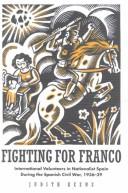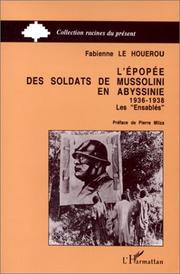| Listing 1 - 10 of 116 | << page >> |
Sort by
|
Book
ISBN: 1784385301 9781784385309 9781784385323 1784385328 9781784385293 1784385298 Year: 2019 Publisher: Barnsley, S. Yorkshire
Abstract | Keywords | Export | Availability | Bookmark
 Loading...
Loading...Choose an application
- Reference Manager
- EndNote
- RefWorks (Direct export to RefWorks)

ISBN: 0718501268 Year: 2001 Publisher: London ; New York Leicester University Press
Abstract | Keywords | Export | Availability | Bookmark
 Loading...
Loading...Choose an application
- Reference Manager
- EndNote
- RefWorks (Direct export to RefWorks)
Book
ISBN: 9788408115045 8408115049 Year: 2013 Publisher: Barcelona: Planeta,
Abstract | Keywords | Export | Availability | Bookmark
 Loading...
Loading...Choose an application
- Reference Manager
- EndNote
- RefWorks (Direct export to RefWorks)
Book
ISBN: 0367616904 9780367616908 Year: 2021 Publisher: Abingdon, Oxon ; New York, NY : Routledge,
Abstract | Keywords | Export | Availability | Bookmark
 Loading...
Loading...Choose an application
- Reference Manager
- EndNote
- RefWorks (Direct export to RefWorks)
"This book examines fascist ideology in seven leaders of parties and movements in the interwar period.It makes use of the conceptual morphological approach, focused on core and adjacent concepts, as well as on the interlinkages between them. With such an approach, the book seeks to offer an innovative perspective on fascism and arrive at a conceptual configuration of fascist ideology, capable of highlighting its main concepts and combinations. Furthermore, it examines the major texts of seven leaders from Germany, Italy, the UK, Portugal, Spain, France and Romania – Adolf Hitler, Benito Mussolini, Oswald Mosley, Rolão Preto, Primo de Rivera, Marcel Déat, and Corneliu Codreanu. With the conceptual approach, the book reasserts the possibility of finding a definition of generic fascism at the same time as depicting the ideological varieties espoused by each leader.This title will be of interest to students and scholars of fascism, extremism and the far right."
Fascism. --- Fascists. --- Fascisme. --- Fascistes. --- fascism. --- fascists (people) --- Fascism --- Fascists
Book
Year: 1932 Publisher: Paris : Paris : Albin Michel, éditeur, Établissements Busson
Abstract | Keywords | Export | Availability | Bookmark
 Loading...
Loading...Choose an application
- Reference Manager
- EndNote
- RefWorks (Direct export to RefWorks)
Fascism --- Fascists --- Mussolini, Benito,
Book
ISBN: 1474281125 1474281109 9781474281119 1474281117 9781474281102 9781474281126 9781474281096 1474281095 Year: 2017 Publisher: [London] : Bloomsbury Academic,
Abstract | Keywords | Export | Availability | Bookmark
 Loading...
Loading...Choose an application
- Reference Manager
- EndNote
- RefWorks (Direct export to RefWorks)
"Bringing together an expert group of established and emerging scholars, this book analyses the pervasive myth of the 'new man' in various fascist movements and far-right regimes between 1919 and 1945. Through a series of ground-breaking case studies focusing on countries in Europe, but with additional chapters on Argentina, Brazil and Japan, The "New Man" in Radical Right Ideology and Practice, 1919-45 argues that what many national forms of far-right politics understood at the time as a so-called 'anthropological revolution' is essential to understanding this ideology's bio-political, often revolutionary dynamics. It explores how these movements promoted the creation of a new, ideal human, what this ideal looked like and what this things tell us about fascism's emergence in the 20th century. The years after World War One saw the rise of regimes and movements professing totalitarian aims. In the case of revolutionary, radical-right movements, these totalising goals extended to changing the very nature of humanity through modern science, propaganda and conquest. At its most extreme, one of the key aims of fascism -- the most extreme manifestation of radical right politics between the wars -- was to create a 'new man'. Naturally, this manifested itself in different ways in varying national contexts and this volume explores these manifestations in order to better comprehend early 20th-century fascism both within national boundaries and in a broader, transnational context."--Bloomsbury Publishing.
Film

Year: 2010 Publisher: [Burbank, Calif.] Turner Entertainment Co. Warner Bros. Entertainment Inc. Warner Home Video
Abstract | Keywords | Export | Availability | Bookmark
 Loading...
Loading...Choose an application
- Reference Manager
- EndNote
- RefWorks (Direct export to RefWorks)
"In pre-World War II London, Spanish agent Denard struggles to close a high-level business deal that will strike a blow against fascists in his native country. But industrialists not yet alert to the threat of fascism reject him. A teenage ally caught up in his efforts is murdered. And the mission itself seems a failure. Yet neither the story nor Denard will stop there. Charles Boyer plays Denard and Lauren Bacall is a jaded industrialist heiress who assists him in this intricate spy drama."--Cover.
Book
ISBN: 8804512644 Year: 2003 Publisher: Milano : Mondadori,
Abstract | Keywords | Export | Availability | Bookmark
 Loading...
Loading...Choose an application
- Reference Manager
- EndNote
- RefWorks (Direct export to RefWorks)
Book
ISBN: 0333760859 Year: 2000 Publisher: Houndmills London Macmillan
Abstract | Keywords | Export | Availability | Bookmark
 Loading...
Loading...Choose an application
- Reference Manager
- EndNote
- RefWorks (Direct export to RefWorks)

ISBN: 2738424074 Year: 1994 Publisher: Paris : L'Harmattan,
Abstract | Keywords | Export | Availability | Bookmark
 Loading...
Loading...Choose an application
- Reference Manager
- EndNote
- RefWorks (Direct export to RefWorks)
| Listing 1 - 10 of 116 | << page >> |
Sort by
|

 Search
Search Feedback
Feedback About UniCat
About UniCat  Help
Help News
News